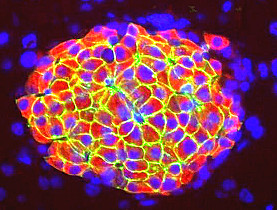
Swiss spend heavily to learn language of life

Universities, research institutions and industry in Switzerland aim to make the country a world leader in systems biology - an approach to learn the language of life.
About SFr400 million ($357.8 million) is to be invested in this emerging field over the next four years in a research initiative called SystemsX.ch. This sum in one research field is unprecedented in Switzerland.
After decoding the genomes – total genetic information – of various plants, animals and microorganisms, systems biology is regarded as the next major step that will drive biological research.
Those behind SystemsX.ch say the efforts of systems biology may offer the pharmaceutical industry a way out of its “innovation crisis”.
The universities of Basel, Bern, Lausanne, Fribourg, Geneva and Zurich, the Paul Scherrer Institute, Friedrich Miescher Instutute and the Swiss Institute for Bioinformatics have teamed up with the two federal institutes of technology in Zurich and Lausanne to support the initiative.
“Unparalleled”
“A cooperation of this magnitude among the universities is of unparalleled character, and on many levels embodies the way projects should be tackled and coordinated among Swiss institutes in the future,” Charles Kleiber, State Secretary for Education and Research, told a news conference in Bern on Wednesday.
In its autumn session, the Swiss parliament allocated SFr200 million for research in the area of systems biology from 2008-2011, subject to annual budget decisions.
Around SFr100 million will flow into systems biology research projects at universities and other significant Swiss research institutions which are partners of SystemsX.ch.
However, funds will only be distributed to those partner institutions if they commit an equal amount to the research project in question.
In practice, this means that the government requires an additional SFr100 million to come from the individual partners of SystemsX.ch.
Largest initiative
If, as expected, SFr400 million flows into the programme, it will represent the largest thematically defined research initiative in recent Swiss history.
In international comparison, the Swiss investment will be top of its class when spending is considered per head of the population. Since 2004 Britain has invested SFr214 million into systems biology research, while in Germany the government plans to spend SFr62 million per year on it from 2008-2011.
The management office of the initiative has so far received 18 applications for research projects funded by SystemsX.ch.
“The scope and volume of individual projects should be in the range of SFr1-5 million per year,” said Ralph Eichler, chairman of SystemsX.ch and president of the Federal Institute of Technology in Zurich.
In addition, SystemsX.ch will fund some 40 interdisciplinary PhD projects and 40 interdisciplinary pilot projects to promote cooperation among researchers from various academic backgrounds by allowing them to collaborate on “an exciting and high risk” project for a year.
swissinfo with agencies
Systems biology is a field of study in the biosciences and focuses on the systematic study of complex interactions in biological systems.
It generally refers to a cluster of peripherally overlapping concepts and disciplines – including biology, physics, chemistry, maths, IT and engineering – rather than a single well-delineated field.
Although pharmaceutical industry spending on research and development has increased substantially since 2000, the number of medically active substances that have resulted in an approved pharmaceutical product has declined.
Those behind SystemsX.ch say systems biology offers a way to fight this trend.
The Swiss National Science Foundation (SNFS) has been mandated to supervise the scientific quality of SystemsX.ch projects.
A special SNSF panel has been created for the evaluation and periodical review of all the applications for large and PhD projects.
In addition to its six Swiss National Science Council (SNSC) members, the panel will include internationally recognised experts from various disciplines crucial to systems biology.
It is the first time the SNSF has agreed to be responsible for the quality control of a large research initiative that it is not directly funding.

In compliance with the JTI standards
More: SWI swissinfo.ch certified by the Journalism Trust Initiative






























You can find an overview of ongoing debates with our journalists here . Please join us!
If you want to start a conversation about a topic raised in this article or want to report factual errors, email us at english@swissinfo.ch.